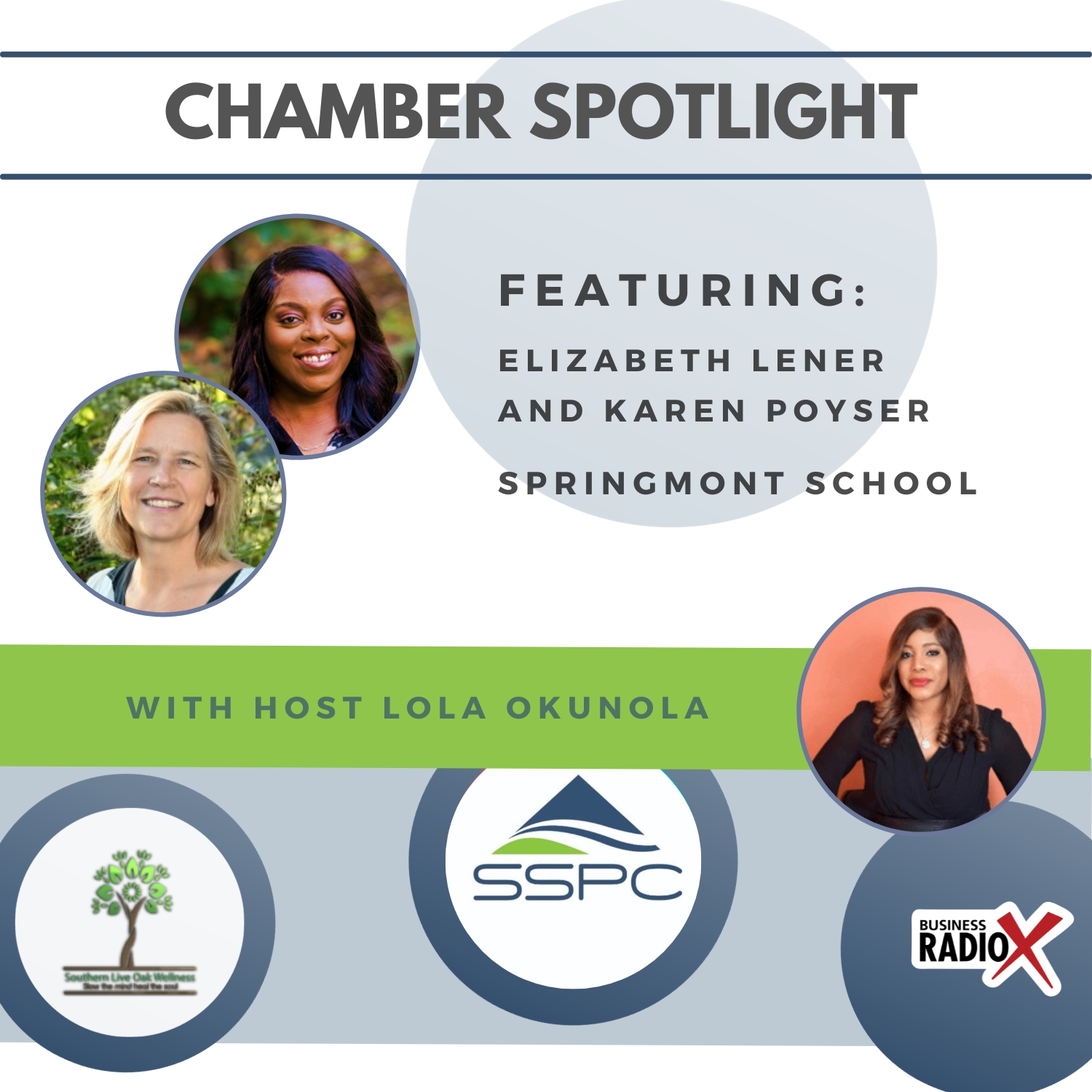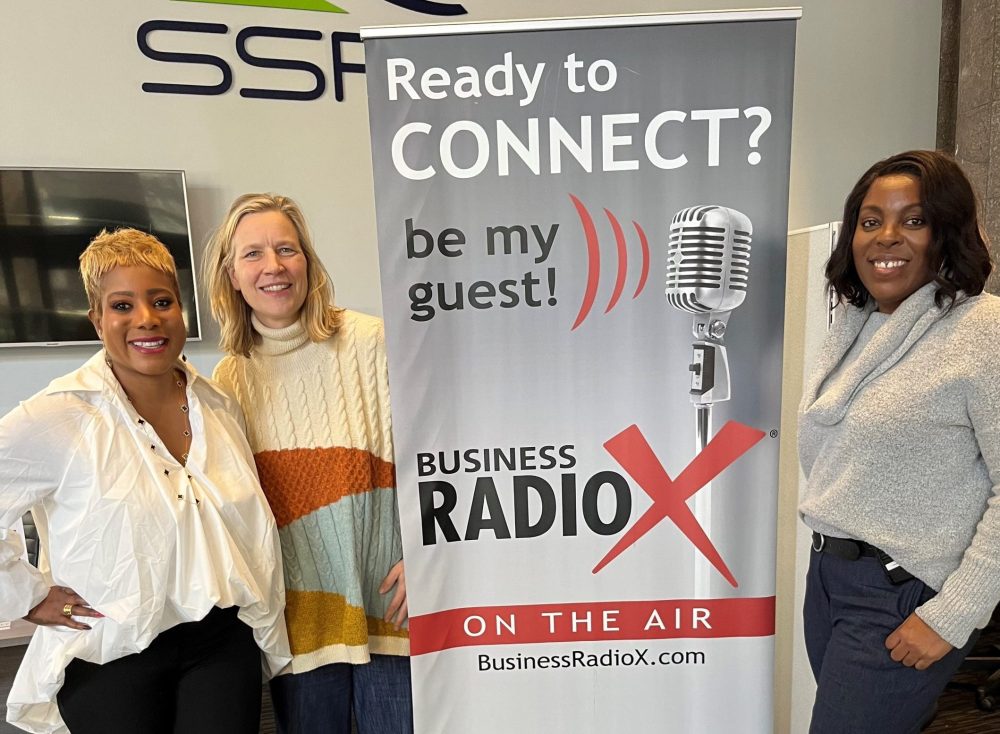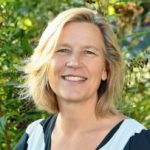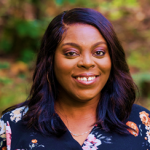

In this episode of Chamber Spotlight, host Lola Okunola discusses Montessori education with Elizabeth Lener and Karen Poyser from Springmont School in Sandy Springs, Georgia. The school offers a unique learning environment, including outdoor education activities and a diverse community.
Elizabeth and Karen explain the Montessori philosophy, emphasizing the importance of a prepared environment that fosters children’s natural development. They also discuss enrollment processes, ways to support the school, and their excitement about being part of the local community.

 Elizabeth Lener, Springmont’s Head of School, appreciates that Montessori children are at the center of their own educational journey.
Elizabeth Lener, Springmont’s Head of School, appreciates that Montessori children are at the center of their own educational journey.
As their lives unfold, they are given the materials and guidance to promote this journey.
There is trust in the child and the knowledge that they will become their best selves in the right environment, which their teachers and caregivers provide.
Lener is an educator with more than 25 years of experience and private school leadership.
 Karen Poyser joined the Springmont administration in 2023. She loves how Montessori encourages and fosters independence, develops community, and offers the gift of time.
Karen Poyser joined the Springmont administration in 2023. She loves how Montessori encourages and fosters independence, develops community, and offers the gift of time.
For more than 20 years she has been involved in nonprofit management and resource development for social justice and youth serving organizations.
Follow Springmont School on LinkedIn and Facebook.
What You’ll Learn in This Episode
- What Springmont School is and what makes it standout from so many other schools in the area
- What Montessori is
- Springmont’s 60th anniversary
- How listeners can support Springmont School, it’s students and educational choice overall
- APOGEE – redirect your state tax liability to support student scholarships
- Sponsorships and/or donations for the 60th Anniversary Auction
This transcript is machine transcribed by Sonix
TRANSCRIPT
Intro: [00:00:07] Broadcasting live from the Business RadioX studios in Sandy Springs, Georgia. It’s time for Chamber Spotlight, brought to you by Southern Live Oak Wellness, providing quality mental health treatment to a population in dire need of being treated as equal. For more information, go to Southern Live Oak wellness.com. Now here’s your host.
Lola Okunola: [00:00:42] Welcome everyone to the Chamber Spotlight Podcast, brought to you by Southern Live Oak Wellness. I’m your host, Lola Okunola, and today’s episode is a special one. As we dive into the world of education. We have fantastic guests lined up for you today. But before we get started, a big thank you to our sponsor, Southern Live Oak Wellness for supporting this podcast. They are dedicated to promoting mental health and wellness in our community. Now let’s jump right in. Our guests today are from the esteemed Springmont School, the first Montessori school in the southeast. Joining us is Elizabeth Lener, the head of school, and Karen Poyser, the director of business development and alumni relations. Welcome to the show, Elizabeth and Karen.
Elizabeth Lener: [00:01:38] Thanks, Lola.
Elizabeth Lener: [00:01:39] We’re excited to be here.
Karen Poyser: [00:01:40] Yes. Thank you for having us.
Lola Okunola: [00:01:44] Awesome. Now, Elizabeth, what is Springmont school and what makes it stand out from so many other schools in our community?
Elizabeth Lener: [00:01:54] Alright, well thank you for asking. Springmont school is a toddler through eighth grade Montessori school in Sandy Springs. We have an enrollment of about 260 students. Our school not only provides a world class Montessori education, but it also provides meaningful opportunities for students to engage in outdoor ed activities ranging from the care of our farm animals. We have goats, chickens, turkeys, bunnies until recently on our farm, on our seven acre main campus, right on Long Island Drive, drive, drive. Yeah, to extended overnight excursions at our 83 acre land school campus in Summerville, Georgia. Additionally, students learn how to access resources in their local environment, including museums, libraries, grocery and hardware stores, parks, and more. We are always out and about. Springmont is a diverse community that honors the background, culture, and perspective of its members.
Lola Okunola: [00:02:50] That is wonderful. Wow. So for our listeners that don’t know what a montessori school really does, tell us. Give us some background. Tell me, tell us, what is a montessori school exactly? Sure.
Elizabeth Lener: [00:03:05] Well, Montessori has been around for over 100 years. It’s an educational method developed initially by Maria montessori in the late 1920s. And as its success grew and was documented and shared, the Montessori method soon spread all over the world and continues to thrive internationally. Maria montessori was a doctor and a scientist who understood that children contain within them the necessary tools for developing and learning, and that what was needed for this development was an environment designed to foster this growth. So this idea is really different from many schools where you feel like where the teacher is giving the knowledge. This philosophy has to do with the children having that knowledge and those abilities and skills within them, and the teacher helping them come out. So it’s really quite different. The environment that we have, it’s in classes is called the prepared environment, and it contains child centered and sized materials presented in an organized and esthetically pleasing and accessible manner. So now when you go into most preschool programs or elementary programs, the furniture is appropriately sized for children. This was not the case in the early 1900s, so even the idea of having chairs and tables that fit the kids and materials that they could work with, with their own hands that were designed for them, was a new idea. Our teachers received specific training on how to guide students in the use of these materials, and the materials are presented in a sequential way in order to build their skills, interest, and understanding.
Elizabeth Lener: [00:04:37] Once a student gets trained on a material, they’re able to choose it during our work period time, which can be from 2 to 3 hours. So when you think about that, thinking about children as young as three, four, five, having several hours where they can choose materials, sometimes the kids will focus on something for ten minutes. Sometimes they’ll focus on it for an hour. So not only are we building the skills, we’re also building the focus. And many of these materials draw from several disciplines at once. As they get older, they’re able to, you know, work for increasingly long periods of time. Another really interesting aspect of Montessori is that the students learn in Multi-age classrooms. So you have students that are age four, five and six in the same classroom, for example, so that the older ones can teach the younger ones. And it turns out that children really enjoy learning from peers, sometimes even more than they enjoy learning from adults. So it works out both ways. So our school actually goes all the way up through eighth grade. And so. Um, the children. Many of the children stay for the whole time. Some children come, you know, midway through the program.
Elizabeth Lener: [00:05:47] But when they stay in a class for three years, not only are they having strong bonds with their classmates, but they’re also getting that strong relationship with their teachers. And in addition to the work in the class, they’re doing PE classes and art and music. So they’re out and about. Our seventh and eighth grade program is really a transition from Montessori into their next school post. Post Springmont. A lot of our students will go to other independent schools, maybe more traditional schools, Catholic schools and public schools. So the seventh and eighth grade program is really a bridge for them, where students can study algebra, geometry, biology, physical science, and even Latin. One thing that we always hear about our graduates is how well equipped they are to handle all the different kinds of school environments they go to, and the extent to which, and this is true of Montessori students, that they’re regarded as students who really know themselves. They can self advocate, problem solve, and they engage in learning for learning sake, not for the grade. And beyond high school, our graduates are artists, doctors, engineers, scientists, authors, many of whom come back to springmont when it’s time for their own children to go to school. So that’s really a special time for us when we have alumni come back and their parents and grandparents. It’s exciting. Yes.
Lola Okunola: [00:07:06] Wow, that’s really wonderful. So Springmont was founded in 1963. Right? Yeah. Tell tell us a little bit more about that. Sure.
Elizabeth Lener: [00:07:14] So in 1963, a small group of parents were looking for a school and looking for a developmental approach that really, you know, honored where children were at at young ages. And someone in the group had heard about Montessori. There was no other Montessori school in the southeast part of the United States to go look at. So they went overseas and went looking there and liked what they saw and decided to have that be. The philosophy that guided Springmont and Springmont was first known as the first Montessori school of Atlanta, very appropriately. And they sent an educator. There weren’t any educators here who knew Montessori, right? So we had to send someone over. And the training is not a two month process. It’s a several year long process. So they really dedicate it was a long term, you know, look into that and send someone over to get trained. And so we started in the basement of Pace Academy and only had, I think, eight students as we started. But then, you know, shortly thereafter, I think we were up to 30 or 40, right? In that first year. We came to the Long Island Drive campus in 1973. And as I said, it’s a seven acre campus where we have several buildings and space for outdoor activities as well as our farm animals.
Elizabeth Lener: [00:08:35] So it’s a really special place, sort of nestled in Sandy Springs. We changed our name to Springmont in 2012 to honor Sandy Springs as well as the Montessori. Right. So that’s become our new name, and we’re accredited by the Association of Montessori International, which holds schools to the highest standards of instruction, including a requirement that all of our lead teachers must be Army trained and certified. So lots of schools can call themselves Montessori, and they might use some of the approaches or some of the materials. But a school like Springmont follows all of that. All of the rigor and all of the procedures and processes that have been studied and borne out by research. That’s one of the things that’s excited about being in Montessori education is over the years, there’s more brain research has happened and child development research has happened. The things that she knew to be true by studying children in their environment have been backed up by research. So it’s really kind of exciting to know, like what we knew to be true. Science is also showing. Data is also showing, you know, with all the advanced techniques that are out there now, why it works.
Lola Okunola: [00:09:47] That’s great. Well, congratulations to you guys to Springmont for taking that initiative 60 years ago. Yeah. You know, to to do something like this and you’re reaping the rewards. It’s it’s really remarkable.
Elizabeth Lener: [00:10:01] Yeah. It is really exciting when you have alumni come back and especially like I said, when they bring their own kids, we have alumni that serve on our board. Yeah. And they talk about what it meant for them to be at Springmont and why they come back and why they continue to serve. And it really is. I mean, Springmont is the kind of school that’s a community that you join, right? Right. It’s not just I dropped my kid off and pick them up. At the end of the day, it’s not like that kind of transaction. It’s you join with another group of parents who are all trying to figure out things together at the same time. We have we have counselor coffee talks. We have lots of parent education. And what we’re really seeking to do is the Montessori method works best when parents are fully engaged and things at home mirror what’s happening at school. So we do spend a lot of time inviting. Parents are invited to come in. They spend hours coming to observe their children. We do also zoom observations so they can sort of see the classroom without the impact of them actually being there, because sometimes your child will act different if you’re in the room, right? Right. So we do observations by zoom so that parents can see they can come in and volunteer in all sorts of ways to do the parent education. We have all sorts of events. So it’s really like a community that you join. And the longer you stay, the more you reap the benefits from it.
Lola Okunola: [00:11:17] So that’s awesome. So for our listeners today that are interested in enrolling their children at Springmont or their grandchildren or just to learn more, sure. Tell us, how do they do that?
Elizabeth Lener: [00:11:30] Sure. Well, we invite anyone to come check out our website at springmont.com and all the information is there. But the basic process is we want you to come in and see the school. So we offer tours for our mission. Person offers tours so you can come in and see it, because I think you really have to see it to understand it, unless you’re very familiar with Montessori. But even so, like spring wants its own place, so you want to come and see it because it’s hard to put into words. You really need to see it in action. So I think it starts with the tours and coming and asking. Questions. We sometimes will have parents and teachers available for the tours too. So you can really get your questions answered. And sometimes even our kids join in and answer questions. I think they’re the best spokespeople for Springmont. But so that’s kind of where it starts is checking us out on the website, coming for a tour. We have an application process. Those are available now. Applications are due February 1st. And as I said, we serve children starting at 18 months through eighth grade. But you are welcome to come on the early side. If you’re someone that likes to look ahead and your child isn’t at 18 months yet and you just sort of want to see. That’s a really good idea to start shopping around early because you want to you want to know what’s out there, and you want to have that in place that always makes you feel a lot better where you know where your child’s going. So we often will have children that are on the wait list that as they age into the program, they’re going to start, right?
Lola Okunola: [00:12:57] Yeah. Wow. Well, now, as we know, it takes a lot to keep a school running. Yeah. So how other than enrolling your children, how can our listeners support Springmont school? Karen. Yeah, that’s my my Lane. We are always looking to partner with businesses and anybody who wants to lend their support to Springmont. And there are several ways to do that. Of course, you can always make a donation to our Springmont fund. That’s our annual giving fund. You know, we just passed Giving Tuesday and there was an opportunity for everybody to give to every charity. Springmont is a 501 C, three certified charitable organization in the state of Georgia. And so people can give and look for those tax deductions later. And we take gifts of cash check credit card, one time gifts, reoccurring gifts. We take matching corporate gifts. And we’re really open to conversations about matching corporate gifts. If there’s an organization, a business that would like to match our donors, we also take gifts of grants. Of course, grant funding. We love that. Or gifts of stock. Any of those things are accepted and all are encouraged. The other opportunity, and that’s just one way to give to our Springmont fund two other really big opportunities. One is apogee. A lot of people are not familiar with Apigee, but they may have heard of it called the Georgia State Scholarship Program. Basically, you can redirect your tax dollars so that you’re not paying for the potholes on the highway. Instead, you are paying for a young person to go to school. This is a scholarship where you can afford a family and a child educational choice. Montessori does not have to be out of reach for anybody and it’s all on us. And when I say redirect your tax dollars, individuals can do up to $1,200 or I’m sorry, up to $2,500. Couples 5000 and businesses can do 75% of their tax liability. Wow. Right. This is incredible. Wow. We need our we need our business owners to to understand that they can this listen. Yes.
Elizabeth Lener: [00:15:12] And this is money you’re giving anyway, right? Right. You’re just changing.
Lola Okunola: [00:15:16] You are just changing. Instead of your instead of paying for the pothole, you are truly paying for young people to get a quality education. Now tell us a little bit more. When do these do businesses need to to do this? Do they go to their accountant? Do they do this at tax when they’re filing their taxes. Like give us a little bit more? Yeah. Thank you so much for asking. So there are a couple of things that you need to know about this program. Applications are being accepted right now and the deadline is December 15th. The state has allocated $1.5 million towards educational choice. And in order for your tax dollars basically to be in that bucket, you apply today or before December 15th, okay. And in January the state will respond to you. Yes, you have been approved. And you can you can allocate whatever percentage of your tax liability for educational choice and enjoy that tax credit in 2025. This is the law. And once you’re in you’re in. It’s it’s good and you reap the benefit over and over and over again. This is a win win situation for everybody, for the business owner, for the young person and for society in general. Right, right. Right. There is there is no loss here. And like you said, this is money you would have spent already, right? Right. Our governor is coming to collect.
Elizabeth Lener: [00:16:43] Wow. I mean, and that money makes a huge difference at a small school like Springmont. I mean, that’s that’s somebody else who can go to school, right? Every time somebody donates. Yes, you can put that money for financial aid. It’s awesome.
Lola Okunola: [00:16:54] So I’m always singing this song. You hear me say this all the time. Apogee, apogee, apogee. Redirect your tax dollars so that a young person can go to school. One last. It’s the opportunity to support Springmont. And this is a huge one because sometimes people just don’t have the funds, but there are other things they want to do or can do, but they just need to be a little creative. As you heard Elizabeth say, we are celebrating 60 years. Yes, yes, that’s a huge deal. Yes. So for our 60th anniversary, Golden Jubilee, it is our Diamond Jubilee. Your time. Oh my goodness. Diamonds. Yes, yes. So for our Diamond Jubilee, we are having our anniversary auction in April. You can’t have an auction without goods. So if there are businesses out there that want to provide us something to two for the auction, you know, a hotel that wants to give us a weekend stay, a restaurant that wants to give us a gift card for dinner for two, you know, another restaurant that wants to provide meals for a week, a chef who wants to do a private dinner, a nail salon. You want to give me a gift certificate? Whatever it is, I’m open to it.
Lola Okunola: [00:18:08] We can put together packages. I’m trying to procure auction items today. So. Okay, hit us up springmont.com. Or you can email me directly at development@springmont.com. And of course there are sponsorship opportunities. Sponsorship opportunities as little as $1,000 with marketing benefits okay. Up to 15,000 if your pockets can stand it and you feel like this is a cause you really want to get behind, there are plenty of rewards on the on the flip side of that, but I have sponsorship opportunities from beginning to end. Wow wow, this sounds so exciting! Thank you so much for sharing all this information. Thank you for having us. This has been incredible and I am I’m really excited to be a part of the Sandy Springs community and really reach out to the business owners here, because I do feel like there are there are so many opportunities for us to work together for the good of our young people. Absolutely, absolutely. Thank you, thank you. This wraps up another episode of the Chamber Spotlight podcast, sponsored by Southern Live Oak Wellness. A big thank you to our guest, Elizabeth Leonard.
Elizabeth Lener: [00:19:20] Thanks for having us.
Lola Okunola: [00:19:21] And Karen Poyser.
Karen Poyser: [00:19:22] Yes, it’s been a pleasure.
Lola Okunola: [00:19:23] And to our listeners, thank you for tuning in. Don’t forget to subscribe for more insightful conversations about our communities, movers and shakers. Until next time, stay well.














